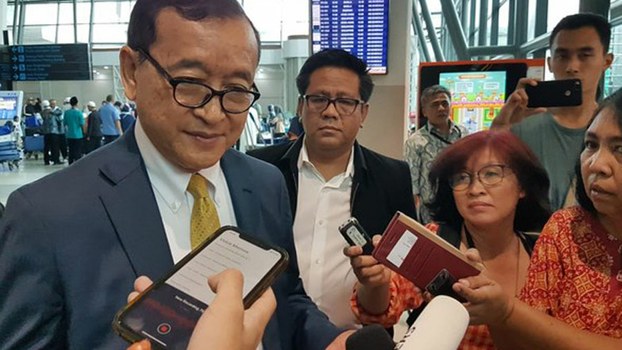




Exiled Cambodian opposition leader Sam Rainsy praised Indonesia’s democracy on Thursday in Jakarta as he pondered his plans to return to Phnom Penh, where the government released dozens of activists detained for aiding his challenge to strongman ruler Hun Sen.
Rainsy, acting head of the banned Cambodia National Rescue Party (CNRP), flew in from Malaysia after his planned return to Cambodia on Saturday was thwarted. Cambodian authorities barred him and neighboring Thailand refused to let him fly into Bangkok.
“They push for the respect for universal human rights, especially human rights in Southeast Asia. Spiritually, they encourage us to struggle for human rights and real democracy in Cambodia,” he told RFA’s Khmer Service after meeting Indonesia lawmakers and human rights officials.
“They said that human rights is a universal value, meaning that human rights in one country is not different than that in other countries,” said Rainsy.
“We have received emotional support from them, because they have encouraged us to demand respect for human rights in Cambodia and fight for a real democracy like in Indonesia,” he told RFA.
In Phnom Penh, meanwhile, Prime Minister Hun Sen ordered prosecutors across the country to speed up the process of releasing CNRP activists, detained in the run up to Rainsy’s planned homecoming on Nov. 9 from four years in exile. The government had labeled his return plans a “coup attempt.”
"The (coup) plot had ill will, but people did not join it," said Hun Sen on Thursday.
'You were cheated'
He said more than 70 opposition activists would be released on bail "for the sake of national unity.”
“Those who are in hiding, please return home. We understood your situation, but we couldn’t say that before Nov 9. You were cheated,” said Hun Sen, who has ruled Cambodia since 1985.
“Today as a leader of the executive branch I appeal to all who are fleeing to return home. Local authorities, armed forces please stop and let them come home,” he said.
RFA was able to confirm that 17 CNRP activists were released from detention Thursday with 71 others detainees still being held.
CNRP activists, however, remained suspicious of Hun Sen’s gesture, even those who were released Thursday.
“What happened to me is very unjust. I didn’t have any weapons. I just wanted to accompany Sam Rainsy to return home for national reconciliation,” CNRP activist Nuth Pich told RFA.
He and other CNRP activists noted that charges against them were not dropped and they merely were released on bail.
CNRP activists outside Cambodia said they would wait for the political situation to improve before returning.
“What the government has done now is just to ease tensions with the international community,” said Klaing Bunlai.
EU pressure cited
Analyst Lao Mong Hai told RFA that Hun Sen’s gesture doesn’t offer genuine clemency and was the result of pressure over trade from the European Union.
“Hun Sen has no choice because he is losing EBA,” said exiled activist Khem Roeun, referring to the EU’s Everything But Arms scheme of trade preferences enjoyed by Cambodia that is at risk as a result of Hun Sen’s rollback of democracy since 2017.
“We won’t fall into his trap,” he told RFA.
On Tuesday, the EU issued a confidential 70-page report warning Cambodia that it has not taken enough steps to prevent a loss of its special EBA trade privileges, noting particularly "further deterioration" of its human rights record since a review process was launched nine months ago.
The report came ahead of a looming February 2020 deadline for the EU to decide whether to remove Cambodia from a scheme that gives the world's poorest countries duty-free, quota-free access for all products except arms and ammunition.
Government spokesman Phay Siphan declined to comment on the EU report, but said the release of CNRP activists had “nothing to do with the EBA.”
“They were arrested because they participated in the coup plot,” he told RFA.
Rainsy, however, credited the EU pressure with the gestures by Hun Sen, which also included the relaxation Sunday of the house arrest terms of former CNRP President Kem Sokha. He can now travel inside the country but is still forbidden from conducting political activities.
“I believe the situation in Cambodia is changing and changing fast within one month because the EU is putting out its condition very clearly,” he told RFA.
“The political prisoners who have been arrested and detained unjustly in recent weeks and months will be all set free," added Rainsy.
He said he planned to stay near Cambodia because “it will be faster when I need to go to Cambodia.”
The EU launched the process to strip Cambodia of its preferential trade terms following the arrest in 2017 of Kem Sokha and the banning of the popular CNRP ahead of elections last year.
The ban and a crackdown by Hun Sen on NGOs and the media paved the way for his ruling Cambodian People’s Party (CPP) to win all 125 seats in parliament in the July 2018 elections.
Indonesia’s National Commission on Human Rights chairman Achmad Taufan Damanik said after meeting Rainsy that Jakarta needed to speak up more for Cambodian democracy.
"That's the point of Indonesia being elected to the U.N. Human Rights Council," he told BenarNews.
"ASEAN should not keep silent. Even though ASEAN members can't interfere in the domestic affairs of another member, at least there should be a dialogue on how not to use violent means," he added.
Reported by RFA’s Khmer Service and by BenarNews, an RFA-affiliated online news service. Khmer translation by Samean Yun. Written in English by Paul Eckert.